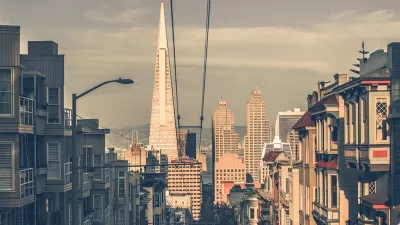Palo Alto may be one of America's most bike-friendly small cities, but when it comes to bikeshare, it's been a flop. It's not alone—ridership has been low in Mountain View and Redwood City as well.
"[Palo Alto] is now eagerly pursuing more than a dozen bike projects, including a new bike bridge [with an estimated price tag of $10 million] over U.S. Highway 101, and its share of students pedaling to school has been rapidly increasing in recent years," writes Gennady Sheyner of Palo Alto Weekly. "Yet for all the excitement, the Bike Share program has been a flop and, as a result, Palo Alto is not included in the list of cities that would get bikes under the expanded program."
According to the 17-page Metropolitan Transportation Commission (MTC) memo [PDF] for the April 8 Administration Committee meeting agenda, the bike share utilization was too low in the three Peninsula cities to warrant being included in the expansion proposal.
| City | Trips per bike per day | # of bikes |
| Mountain View | 0.48 | 54 |
| Palo Alto | 0.21 | 37 |
| Redwood City | 0.07 | 52 |
| San Francisco | 2.6 | 328 |
| San Jose | 0.39 | 129 |
As noted here on April 4, Bay Area Bike Share is poised to expand ten-fold, entering three new cities in the East Bay (Berkeley, Emeryville, and Oakland), and increasing bikes in the Bay Area's two largest cities, San Francisco and San Jose.
Left out are Redwood City, Palo Alto, and Mountain View. And here's the controversial part in the MTC proposal: If those cities want to remain in the program, they will have to fund it, as Andrew Boone of Streetsblog SF explained prior to the MTC meeting.
Reporting on the MTC meeting, KCBS's Margie Shafer note's MTC Commissioner and San Mateo County Supervisor Adrienne Tissier's objection to the "pay to play" offer extended to the three cities. Redwood City is in San Mateo County while Palo Alto and Mountain View are just south in Santa Clara County. [Listen here.]
“I guess the part I don’t appreciate is all those that were in the pilot program are now going to be asked to pay to get back in,” she said.
Yhy the low usage in Palo Alto?
Robert Neff, who chairs the Palo Alto Bicycle Advisory Committee, "speculated that this is because Palo Alto just doesn't have the type of size and density that makes bike share such a viable option in cities like San Francisco, New York City and Washington, D.C.," writes Sheyner. "In those cities, people can use the bike-share programs in conjunction with transit to plot out elaborate systems for getting around town."
Neff misses a key point though. Palo Alto's downtown (University Ave.) train station has the highest Caltrain ridership outside of the San Francisco depot.
Neff, whose committee helped determine the stations where the bikes would be placed, said he's not too disappointed about Bike Share possibly leaving Palo Alto."
"I think it makes more sense to really get it going in places like San Francisco, Oakland and San Jose, where there is more density and where it would be more widely used," Neff said.
When the full Commission meets on May 27, they will make the final determination as to how to deal with the three cities. According to a phone call with MTC spokesman Randy Rentschler, the bike share "pilot program" is expected to transition into a ten-year, public-private partnership with Motivate.
When asked about the low ridership in San Jose, Rentschler explained that there are other factors to consider, such as advertising on the bikes and at the docking stations. Currently neither haves ads.
Bay Area Bike Share is one of the few regional bike share programs. Looking at the ridership numbers listed above, one might ask if it makes more sense to restrict it to San Francisco. It will be interesting to see if the East Bay cities fare better than their Peninsula counterparts.
Hat Tip: MTC Headlines
FULL STORY: Bike Share's expansion plan leaves Palo Alto behind

Maui's Vacation Rental Debate Turns Ugly
Verbal attacks, misinformation campaigns and fistfights plague a high-stakes debate to convert thousands of vacation rentals into long-term housing.

Planetizen Federal Action Tracker
A weekly monitor of how Trump’s orders and actions are impacting planners and planning in America.

Chicago’s Ghost Rails
Just beneath the surface of the modern city lie the remnants of its expansive early 20th-century streetcar system.

Bend, Oregon Zoning Reforms Prioritize Small-Scale Housing
The city altered its zoning code to allow multi-family housing and eliminated parking mandates citywide.

Amtrak Cutting Jobs, Funding to High-Speed Rail
The agency plans to cut 10 percent of its workforce and has confirmed it will not fund new high-speed rail projects.

LA Denies Basic Services to Unhoused Residents
The city has repeatedly failed to respond to requests for trash pickup at encampment sites, and eliminated a program that provided mobile showers and toilets.
Urban Design for Planners 1: Software Tools
This six-course series explores essential urban design concepts using open source software and equips planners with the tools they need to participate fully in the urban design process.
Planning for Universal Design
Learn the tools for implementing Universal Design in planning regulations.
planning NEXT
Appalachian Highlands Housing Partners
Mpact (founded as Rail~Volution)
City of Camden Redevelopment Agency
City of Astoria
City of Portland
City of Laramie



























